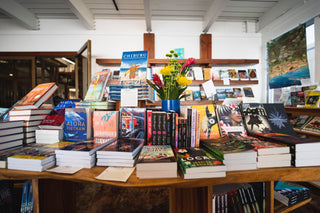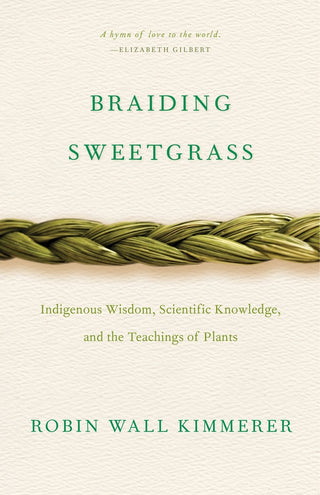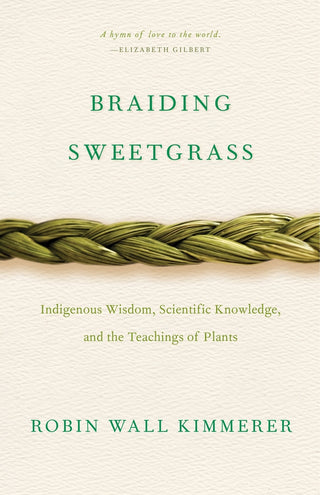Author: Robin Wall Kimmerer | Paperback
A New York Times Bestseller • A Washington Post Bestseller • Named a "Best Essay Collection of the Decade" by Literary Hub
As a botanist, Robin Wall Kimmerer has been trained to ask questions of nature with the tools of science. As a member of the Citizen Potawatomi Nation, she embraces the notion that plants and animals are our oldest teachers. In Braiding Sweetgrass, Kimmerer brings these two lenses of knowledge together to take us on "a journey that is every bit as mythic as it is scientific, as sacred as it is historical, as clever as it is wise" (Elizabeth Gilbert).
Drawing on her life as an indigenous scientist, and as a woman, Kimmerer shows how other living beings--asters and goldenrod, strawberries and squash, salamanders, algae, and sweetgrass--offer us gifts and lessons, even if we've forgotten how to hear their voices. In reflections that range from the creation of Turtle Island to the forces that threaten its flourishing today, she circles toward a central argument: that the awakening of ecological consciousness requires the acknowledgment and celebration of our reciprocal relationship with the rest of the living world. For only when we can hear the languages of other beings will we be capable of understanding the generosity of the earth, and learn to give our own gifts in return.
**********
"In Braiding Sweetgrass, botanist Robin Wall Kimmerer tackles everything from sustainable agriculture to pond scum as a reflection of her Potawatomi heritage, which carries a stewardship 'which could not be taken by history: the knowing that we belonged to the land.' . . . It's a book absorbed with the unfolding of the world to observant eyes--that sense of discovery that draws us in." --NPR
"Kimmerer eloquently makes the case that by observing and celebrating our reciprocal relationship with the natural world, one can gain greater ecological consciousness." --Sierra Magazine
"With deep compassion and graceful prose, Robin Wall Kimmerer encourages readers to consider the ways that our lives and language weave through the natural world. A mesmerizing storyteller, she shares legends from her Potawatomi ancestors to illustrate the culture of gratitude in which we all should live." --Publishers Weekly
Publisher: Milkweed Editions | Pub Date: September 01, 2014 | Format: Paperback | Pages: 390 | Dimensions: 1.1" H x 8.4" L x 5.5" W | 1.15 lbs
Author: Robin Wall Kimmerer | Paperback
A New York Times Bestseller • A Washington Post Bestseller • Named a "Best Essay Collection of the Decade" by Literary Hub
As a botanist, Robin Wall Kimmerer has been trained to ask questions of nature with the tools of science. As a member of the Citizen Potawatomi Nation, she embraces the notion that plants and animals are our oldest teachers. In Braiding Sweetgrass, Kimmerer brings these two lenses of knowledge together to take us on "a journey that is every bit as mythic as it is scientific, as sacred as it is historical, as clever as it is wise" (Elizabeth Gilbert).
Drawing on her life as an indigenous scientist, and as a woman, Kimmerer shows how other living beings--asters and goldenrod, strawberries and squash, salamanders, algae, and sweetgrass--offer us gifts and lessons, even if we've forgotten how to hear their voices. In reflections that range from the creation of Turtle Island to the forces that threaten its flourishing today, she circles toward a central argument: that the awakening of ecological consciousness requires the acknowledgment and celebration of our reciprocal relationship with the rest of the living world. For only when we can hear the languages of other beings will we be capable of understanding the generosity of the earth, and learn to give our own gifts in return.
**********
"In Braiding Sweetgrass, botanist Robin Wall Kimmerer tackles everything from sustainable agriculture to pond scum as a reflection of her Potawatomi heritage, which carries a stewardship 'which could not be taken by history: the knowing that we belonged to the land.' . . . It's a book absorbed with the unfolding of the world to observant eyes--that sense of discovery that draws us in." --NPR
"Kimmerer eloquently makes the case that by observing and celebrating our reciprocal relationship with the natural world, one can gain greater ecological consciousness." --Sierra Magazine
"With deep compassion and graceful prose, Robin Wall Kimmerer encourages readers to consider the ways that our lives and language weave through the natural world. A mesmerizing storyteller, she shares legends from her Potawatomi ancestors to illustrate the culture of gratitude in which we all should live." --Publishers Weekly
Publisher: Milkweed Editions | Pub Date: September 01, 2014 | Format: Paperback | Pages: 390 | Dimensions: 1.1" H x 8.4" L x 5.5" W | 1.15 lbs
Questions?




